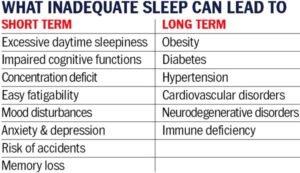A recent study highlights the intricate connection between chronic sleep deprivation and insulin resistance in women, shedding light on the critical role of adequate sleep in maintaining metabolic health. The research, published in the International Journal of Endocrinology, underscores the importance of addressing sleep patterns for overall well-being, particularly in the context of women’s health.
Understanding Sleep: A Fundamental Biological Process
Sleep is a fundamental biological process crucial for overall health and well-being. It is a complex, cyclical phenomenon divided into several stages, including non-rapid eye movement (NREM) and rapid eye movement (REM) sleep. The sleep cycle involves transitioning through these stages multiple times during the night, contributing to physical restoration, memory consolidation, and hormonal regulation.

The Science Behind Sleep and Hormones

The sleep cycle plays a pivotal role in regulating hormones, impacting various physiological processes. Growth hormone, crucial for tissue repair, is predominantly secreted during deep sleep. Additionally, adequate sleep supports the regulation of cortisol, the stress hormone, preventing its dysregulation that can lead to various health issues.
In women, the intricate dance between sleep and hormones is even more pronounced. Hormones such as estrogen and progesterone, which fluctuate throughout the menstrual cycle, can influence sleep patterns. Disruptions to this delicate balance, as seen in chronic sleep deprivation, may have broader implications for women’s health.
Why Women’s Health Matters ?
Women’s health is a multifaceted concept encompassing physical, mental, and social well-being. Hormonal fluctuations, unique reproductive challenges, and societal expectations contribute to the complexity of women’s health. Adequate sleep is a cornerstone of overall wellness, playing a pivotal role in managing stress, sustaining energy levels, and supporting hormonal balance.
Ideal Sleep Requirements for Women: Striking the Balance
The ideal sleep duration varies across age groups, with adults generally requiring 7-9 hours per night. However, individual needs may differ. Quality of sleep is equally important as quantity. Establishing a consistent sleep routine, creating a comfortable sleep environment, and minimizing disruptions contribute to better sleep quality.
For women, understanding and embracing their unique sleep needs throughout the menstrual cycle can enhance overall sleep hygiene. Hormonal fluctuations during the menstrual cycle can impact sleep architecture, requiring a nuanced approach to sleep management.
Managing Sleep and Hormones: A Lifestyle Approach
Women can adopt several strategies to manage sleep and hormonal balance effectively. Regular physical activity, stress management techniques such as meditation or deep breathing exercises, and maintaining a consistent sleep schedule contribute to overall well-being. Additionally, limiting caffeine and electronic device use before bedtime can improve sleep quality.
Maintaining a Healthy Work-Life Balance: The Key to Well-Being

The demands of a modern lifestyle, especially in the professional sphere, often challenge the delicate balance between work and personal life. Striking a harmonious work-life balance is crucial for mitigating stress and fostering optimal sleep patterns. Setting boundaries, prioritizing self-care, and cultivating supportive workplace environments are essential components of achieving this balance.
Consequences of Chronic Sleep Deprivation in Women: Beyond Fatigue

Chronic sleep deprivation in women can lead to a myriad of health consequences extending beyond mere fatigue. Insulin resistance, as highlighted in the recent study, is a notable concern. Insulin, a hormone vital for glucose metabolism, becomes less effective in managing blood sugar levels when resistance develops. This condition is a precursor to type 2 diabetes and poses significant health risks.
Furthermore, chronic sleep deprivation has been linked to an increased risk of cardiovascular diseases, obesity, mood disorders, and impaired cognitive function. Women, who often juggle multiple responsibilities, may be particularly susceptible to these adverse effects.
Managing Sleep Deprivation: Practical Precautions
Addressing chronic sleep deprivation requires a comprehensive approach. Prioritizing sleep as a non-negotiable aspect of self-care is fundamental. Establishing a consistent sleep schedule, creating a conducive sleep environment, and practicing relaxation techniques contribute to better sleep quality.
Avoiding stimulants close to bedtime, such as caffeinated beverages and electronic devices, is crucial for facilitating the body’s natural transition into sleep. Seeking professional guidance if sleep issues persist is also advisable.
In conclusion, the recent study on chronic sleep deprivation and insulin resistance in women underscores the critical importance of prioritizing sleep for overall health. Women, in particular, should be mindful of their unique hormonal dynamics and incorporate lifestyle adjustments to support both quality and quantity of sleep. By fostering a culture that values and prioritizes sleep, individuals can proactively enhance their well-being and reduce the risk of associated health complications.
Also read more on women health at https://biziconic.com/understanding-pcod-an-informative-guide-for-modern-women/